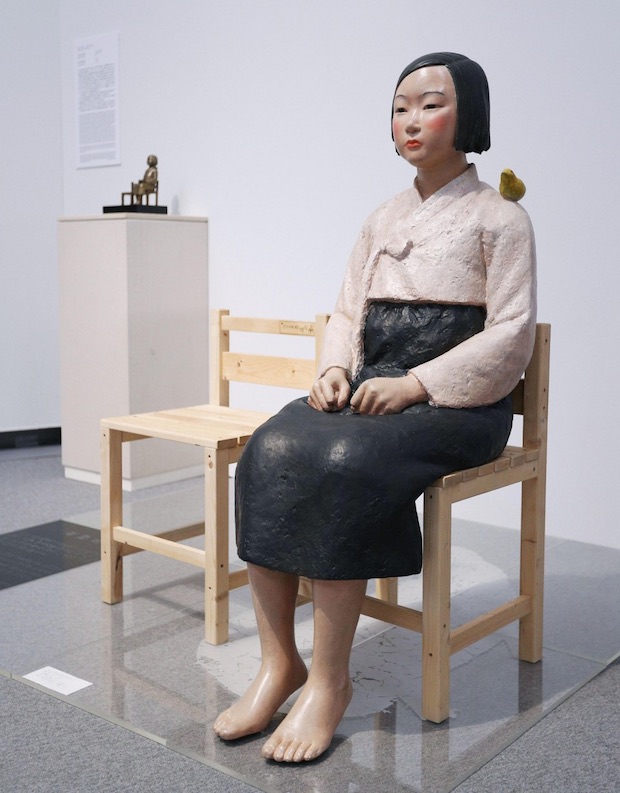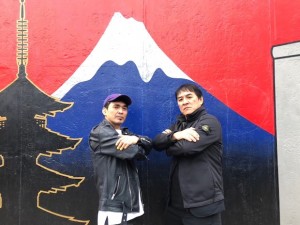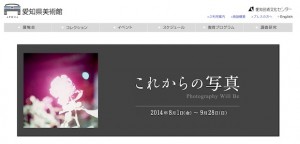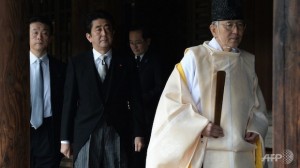An artwork dealing with the historical comfort women issue has ignited one of the biggest scandals in the Japanese art world.
Created by a South Korean husband-and-wife team, Statue of a Girl of Peace was an installation at the Aichi Triennale, a 75-day event that is one of Japan’s largest art festival, visited by 600,000 people. After opening on August 1, the exhibit, which features a sculpture replicating the iconic statue of a young girl that has been installed outside the Japanese embassy in Seoul as a protest, and an empty chair for visitors to sit next to the girl, immediately attracted attention for its provocative themes. The controversy also had the adverse effect of pulling huge crowds to see the exhibition, resulting in a long line just to enter the room.

The comfort women issue refers to the Asian women forcibly recruited to provide sex to Japanese soldiers during World War II, though the testimony of survivors is rejected by many of the right in Japan.
Part of an exhibition at the festival called “After ‘Freedom of Expression?,'” the event seemed to answer its own titular question when the whole section was shut down by the main organizers on August 3rd ostensibly in response to threats of violence by ultra-nationalists in Japan. Fearful of violence after receiving numerous threatening phone calls and messages, the decision was made to ensure the safety of staff and the venue, though there was also overt pressure from the right-wing mayor of Nagoya, Takashi Kawamura, on Aichi Governor Hideaki Omura and the organizing committee.
The team behind “After ‘Freedom of Expression?,'” which included other previously censored exhibits, has expressed shock and anger at the decision to censor the artwork and shut down the exhibition. It has said it is considering legal action, while an online petition launched by supporters calling for the exhibition not to be cancelled has attracted nearly 25,000 signatories as of writing. More significantly, 72 of the artists participating in the triennale have signed a statement on August 6th protesting the decision to close the exhibition.
We insist that After “Freedom of Expression” should remain on view on that condition. Normally an exhibition space is meant to be an open, public site, but the closure of the exhibit just three days after the Triennale opening has robbed people of the opportunity to see the artworks and foreclosed any active discussion of them. Moreover, it has shut down the diversity of responses, ranging from feelings of anger to sorrow, that viewers might have had in front of the artworks. We strongly object to any violent intervention by politicians into exhibits, screenings, and performances at art institutions, and the kinds of menacing acts and intimidation that drove the Triennale to close After “Freedom of Expression” as an emergency measure.
We practice art not to suppress or divide people, but to find different ways of creating solidarity among them, and to pursue the possibilities for free thinking beyond political beliefs. We strive to be creative in the face of uncertainty. Through the production of sculptures, through texts, paintings, performances, music, reenactments, psychomagic, films and videos, and by means of new media technology, by collaborating, and by seeking out new routes and detours, we artists have tried to create a place in the Triennale where, if only temporarily, people’s love and compassion, anger and sadness, and even their murderous feelings can be imaginatively inverted and overturned.
The scandal comes at a time of diplomatic and trade crisis between Japan and South Korea, sparked in part by the continuing traumatic legacy of the war after Korea’s Supreme Court upheld a decision ordering Japanese corporations to pay compensation to Koreans forced to work for them. (Japan has rejected the recent decision, claiming the issues of compensation were settled when the two nations normalized relations in 1965.) This has led to a boycott of Japanese products in Korea and a ban by Japan on exports of three critical chemicals needed to produce semiconductors by Korean manufacturers. The conflict further escalated last week when Japan took South Korea off its list of preferential status nations, officially for security reasons.
This article was written and first published on August 5, 2019. It was subsequently updated with some new information such as the release of the artists’ statement on August 6.
























